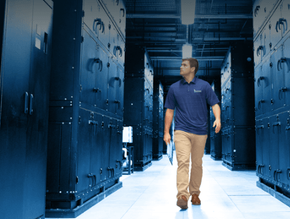Why security needs to be a greater concern for data centres

There have been plenty of trends taking the data centre industry by storm in the last 12 months and continue to take hold, whether that be the exponential growth in hyperscale, colocation and multi-tenancy, issues with workload repatriation, the rising cost of outages, growing demand for edge compute and supply chain issues which are limiting in future capacity.
But one of the growing concerns when it comes to data in any form is properly securing it.
Referred to as the “crown jewels of any organisation” by data storage and data management services company NetApp’s UK and Ireland Chief Technologist Grant Caley, the securing of the data itself can often be cast aside as a result of over focusing on other priorities.
In 2020, Security Intelligence data showed that 64% of companies worldwide that had troubles with cyber attacks, with using the cloud to store their and their customers' data being a contributing factor.
Threats increasingly present in the data landscape
With more than two decades of experience in data management, the majority of which at NetApp, Caley champions NetApp’s partners and enables the delivery of NetApp solutions to customers and has a firm passion for customer experience.
“Data drives everything we do,” Caley declares. “It is behind every decision and every achievement and is foundational for technology.”
For this reason, Caley stresses why data protection is critically important for the data centre and security needs to be taken seriously across the data centre industry — because the threat of cyber attacks is not a case of ‘if’, but ‘when’.
He continues: “There has been a proliferation of cyber-attacks in recent years. With the advent of the cloud, and as data has moved to various environments, data is spread across more sources than ever before. In response, companies must be more diligent with their data and take planning for recovery as critically as they take cyber protection measures.”
Building truly resilient infrastructure
Data protection and data security, starting with the data itself, is at the core of resilient infrastructure, according to Caley. Historically, security focuses for businesses and the likes of data centre facilities surrounded preventing attacks. But now, as cyber crimes become more sophisticated, they vary in nature and become increasingly common, which is why Caley is calling for data centres and their operators to be equally as concerned with data recovery as they are with defence.
“In order to remain protected, organisations must have a consistent approach to data security across all environments and extend security into cloud systems,” he details.
Caley warns that, if businesses neglect data security and focus on other priorities, the impact is overwhelmingly that they are leaving themselves wide open and in a vulnerable position when it comes to major cyber breaches.
“This could cause irreparable organisational and reputational damage,” he cautions. “It’s therefore imperative that companies focus on security to ensure they remain one step ahead of malicious actors which constantly seek new attack methods and exploit various tools and technologies.”
Emerging technologies: Strengthening and weakening defence
The likes of AI, for example — although an exciting and emerging technology positioned to streamline and improve a working environment, can be leveraged for the likes of sophisticated attacks resulting in data breaches.
With this in mind, Caley advocates that prioritising diligence when it comes to security is an essential first point of protection and should be a critical ongoing priority for businesses and their respective employee culture.
And looking to the future, Caley envisions that by tackling security head-on and automating controls, data centre managers’ time and energy will be freed up to focus on what lies ahead.
He professes: “Automation is vital for data centre security. When taking a solely manual approach, there are many variables that can be missed compromising the security of a business. If a data centre doesn’t integrate automation, businesses won’t be able to look ahead at the next wave of attack or look to the future for opportunity.
“In my opinion there isn’t enough automation across the data centre. Businesses can’t look forward to optimising their processes and ditching the administrative duties that take up time, and they can’t benefit from the long-term savings without automation. Driving automation is the primary way to scale the future of data centres, as data grows exponentially.”
Highlighting that data protection safeguards and protects individuals’ or customers' personal data, but also that of an organisation, data protection is critically important for data centres and plays a pivotal role in avoiding considerable problems which may harm reputation.
Companies can ensure a truly resilient infrastructure and future, in Caley’s eyes, boils down to securing elements of data protections so they can’t be compromised.
He concludes: “Data protection is key for organisations to recover as fast as possible from a damaging cyber-attack. Backups are foundational in data protection, meaning a high availability backup will always be required. From a security perspective, those backup’s capabilities must have additional protections layered and embedded to ensure cyber resilience.
“Many cyber-attacks go beyond an initial breach and look to remove an organisation’s ability to recover correctly.”







